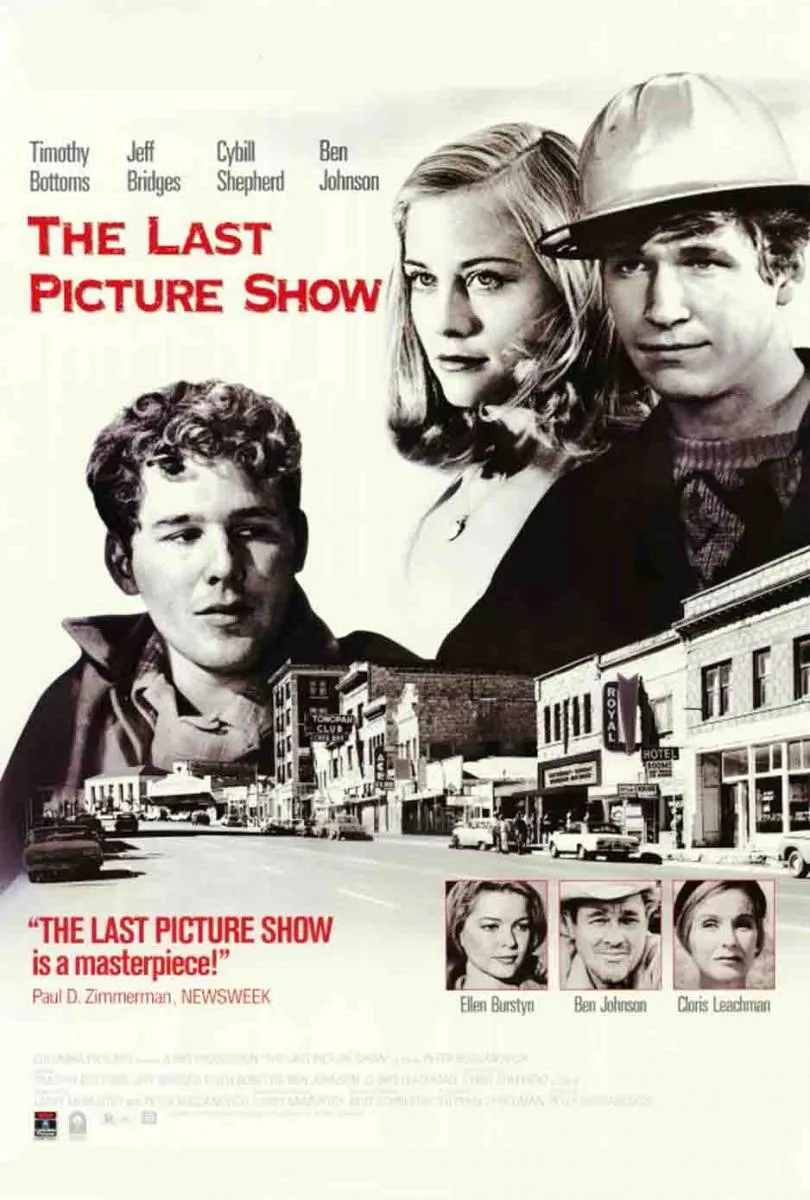
The Last Picture Show is a 1971 American coming-of-age drama film directed by Peter Bogdanovich. It is set in a small town in northern Texas from November 1951 to October 1952 and is based on the semi-autobiographical 1966 novel of the same name by Larry McMurtry. The film's ensemble cast includes Timothy Bottoms, Jeff Bridges, Ellen Burstyn, Ben Johnson, Cloris Leachman, and Cybill Shepherd. It is a story of two high-school seniors and long-time friends, Sonny Crawford and Duane Jackson, and their experiences as they come of age in a bleak, isolated, atrophied North Texas town that is slowly dying, both culturally and economically. The film is praised for its evocative black-and-white imagery and profoundly felt performances, depicting the crumbling of American values, and is considered one of the key films of the American seventies cinema renaissance.
Plot
The Last Picture Show is a coming-of-age drama film set in a small town in northern Texas from November 1951 to October 1952. The film follows the lives of two high-school seniors and long-time friends, Sonny Crawford and Duane Jackson, and their experiences as they come of age in a bleak, isolated, atrophied North Texas town that is slowly dying, both culturally and economically. The film's ensemble cast includes Timothy Bottoms, Jeff Bridges, Ellen Burstyn, Ben Johnson, Cloris Leachman, and Cybill Shepherd. The film is praised for its evocative black-and-white imagery and profoundly felt performances, depicting the crumbling of American values and is considered one of the key films of the American seventies cinema renaissance
Trailer
@taskmaster4450le/re-leothreads-2dvq37r8y
Cast
- Timothy Bottoms as Sonny Crawford
- Jeff Bridges as Duane Jackson
- Cybill Shepherd as Jacy Farrow
- Ben Johnson as Sam the Lion
- Cloris Leachman as Ruth Popper
- Eileen Brennan as Betty Didion
- Frank Marshall as Mitch Hager
- Larry McMurtry as Hank
- Peter Bogdanovich as Sailor
- Bob Wills and His Texas Playboys as themselves (archive footage)
- Phil Harris as himself (archive footage)
- Johnny Standley as himself (archive footage)
- Hank Thompson as himself (archive footage)
Director: Peter Bogdanovich
Writer: Peter Bogdanovich, Larry McMurtry, Larry McMurtry
Box Office Gross: $29,146,131
Distributor: Columbia Pictures
Genre: Drama
Release Date (Theaters): Jan 1, 1971
Release Date (Streaming): May 25, 2010
Theme
The film explores themes of coming of age, small-town life, and the disillusionment of the American Dream. It delves into the complexities of human relationships, the passage of time, and the loss of innocence.
Reception
The Last Picture Show was well-received by critics and audiences. It is considered a key film of the American seventies cinema renaissance, praised for its evocative black-and-white imagery and profound performances. The film received several Academy Award nominations and won two Oscars.
Production Challenges
The production of the film faced various challenges, including capturing the authentic atmosphere of a small town in the 1950s, working with a limited budget, and managing the ensemble cast's performances.
Settings
The film is set in a small town in northern Texas from November 1951 to October 1952, portraying the bleak and isolated nature of the community during that time period.
Visual Styles and Techniques
The film is known for its evocative black-and-white imagery, which contributes to its nostalgic and melancholic tone. The director, Peter Bogdanovich, employed long takes and deep focus to create a sense of intimacy and immersion in the story.
Trivia and Fun Facts
- The film is based on the semi-autobiographical 1966 novel of the same name by Larry McMurtry.
- It features an ensemble cast, including Timothy Bottoms, Jeff Bridges, Ellen Burstyn, Ben Johnson, Cloris Leachman, and Cybill Shepherd.
- The character of Sam the Lion, played by Ben Johnson, is a central figure in the film, representing a sense of wisdom and nostalgia for the town's past.
General:
Page by @iskafan